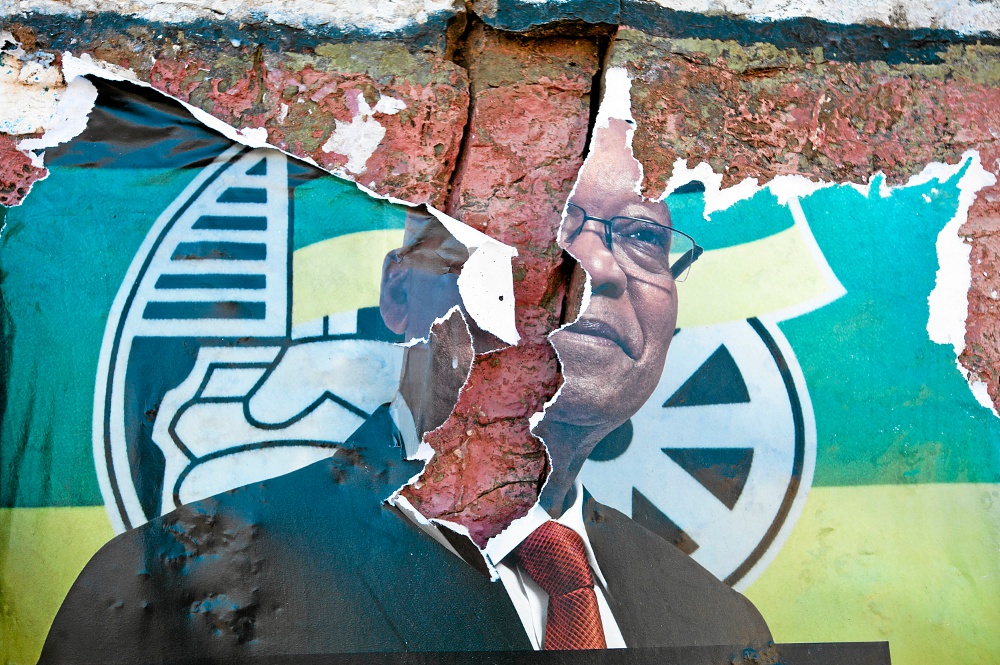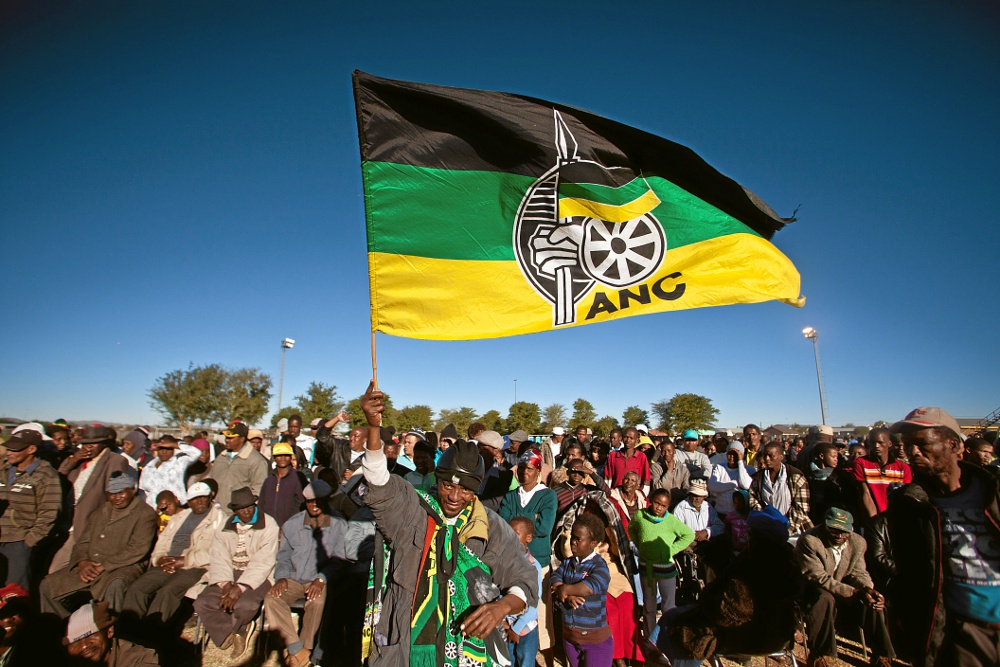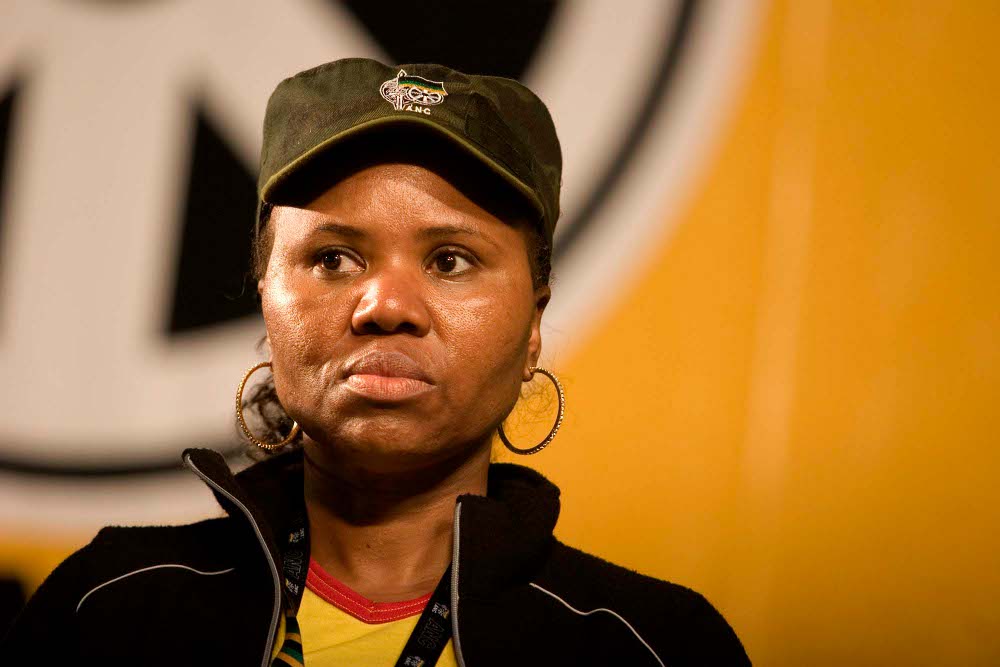Jacob Zuma and Gwede Mantashe have had to face the fact that although the ANC still has the majority vote
The ANC has woken up to the reality that ruling South Africa “until Jesus comes back” might remain just a dream. It has begun to address the fears that it is gradually losing support like many other former liberation movements in Africa have done.
“The threats to the liberation movements in the region is real, hence the need for the ANC to appreciate the reality of the threat, even in South Africa,” the ANC secretary general, Gwede Mantashe, said in a painfully honest report of the party’s national working committee to last month’s national executive committee (NEC) meeting.
The Mail & Guardian has seen the report and it is the ruling party’s most frank admission yet that its position as the super political party in the country is slowly being eroded – although the party puts on a brave face in public and is irritated by anyone who suggests it.
Even President Jacob Zuma was brought to heel at last month’s ANC Youth League consultative conference when he admitted that the ANC was “in trouble”. Mantashe and his deputy, Jessie Duarte, intervened during his speech and called him to order.
A chastened Zuma then said that “the officials were making an intervention, so I had to make an intervention to them”.
It is believed Zuma was referring to Mantashe’s organisational report about the party’s “trouble” when he was cut short.
Agonising lesson
The report also said it had learnt an agonising lesson from its recent performance at the polls – “how the youth and the urban vote are the focal point for recruitment and mobilisation” of opposition parties.
“The concerns of youth regarding employment are used as a mobilising tool,” the report said.
“The urban constituency, as seen with our middle class in recent elections, is another soft spot.”
In its analysis of the election performance of its allies in Mozambique, Botswana and São Tomé and Príncipe, the ANC noted the decline in support for former liberation movements.
The São Tomé and Príncipe Liberation Movement/Social Democratic Party (MLSTP-PSD) secured only 22 of 55 parliamentary seats in the October elections, losing power to the Independent Democratic Alliance.
‘Very tight’ elections
Mozambique’s Frelimo won what the ANC described as “very tight” elections, with its representation in Parliament reduced from 191 seats to 144, and the party lost its two-thirds majority.
Another ANC ally, President Ian Khama’s Botswana Democratic Party (BDP), also found the October election tough. Like the ANC, the BDP has been battling to gain support in urban areas, where opposition parties have gained more votes.
The ANC said, although it was prepared to assist the MLSTP-PSD, the party had left it too late in the campaign to ask for help. “They came to ask for support and resources. They had already conceded they would lose at the polls but were determined to give it their very best.
“This is an indication that more work needs to be done in the continent,” Mantashe’s report said.
These shifts were giving the ANC a wake-up call. “We are not immune to these events,” the report said.
‘Breakaway parties’
The ANC said it was learning lessons from what it saw as “a deliberate establishment and funding of breakaway parties, aimed at ousting progressive parties.
“The viewpoint of the sponsors of these initiatives, which include some who were our friends, is that democracy is best served by a multiple of parties. Against the ANC, it has been said it is too strong and big.”
There have been two significant splits from the ANC in the past five years: a group of former ruling party leaders formed the Congress of the People in 2008, and a younger one established the Economic Freedom Fighters last year. Both of them ate into the ANC’s support at the polls.
Mantashe told the M&G this week that he did not consider the ANC’s hold on power to be under any threat, but he said there was a “systematic offensive” against the party.
“It is happening everywhere. There is an organised offensive against liberation parties,” he said when asked for comment. “There is an anti-majoritarian liberal offensive.”
Mantashe said Parliament was the breeding ground for it.
“If you look at what is happening in Parliament … people don’t care about the truth. They are distorting facts, and on the basis of distorted facts you mobilise,” he said.
‘Factions of the media’
He blamed “factions of the media”, which he accused of repeating distorted facts from opposition parties, and said those media houses formed “part of the offensive” against the ANC.
At the same time, he expressed his suspicion about the functioning of the judiciary.
“To me, the difference is not a threat but an offensive. There is a calculated attack on our movement.”

The ANC cannot rely on its history as a liberation movement for support. (Madelene Cronjé, M&G)
Although he did not name the media houses he accused of colluding with the opposition, his organisational report named the M&G and City Press as the two newspapers that contained sustained negative coverage of the ANC.
Last week the M&G reported about threats made at the same NEC meeting of the party to cut advertising in mainstream newspapers perceived to be anti-ANC.
‘Subtle ways’
Although the ANC described the problems it faced as “subtle ways advocating for regime change in our countries”, it said the problems challenged “progressive parties like ours to also look at their own weaknesses”.
These included neglecting the plight of people, especially the poorest, which “lead our people to gravitate towards these types of [opposition] parties”, according to Mantashe’s report.
“The same can be said about the middle class, which is the beneficiary of change brought about by the freedoms and democracy our movements introduced.
“Critically, what is it that we are doing, or not doing, that impacts negatively on our image and make the people choose to support others?” the report asked.
The ANC believes that opposition parties on the continent can only contest former liberation movements because they “received a lot of foreign funding”.
Reduced majority
In the national elections in May, the ANC scored a reduced majority of 62.15%, the lowest level since it began leading South Africa’s democratic government in 1994. The ANC’s seats in the National Assembly went down to 249 from 264 in 2009 and 279 in 2004.
In the past two elections, the ANC has lost an overall 30 parliamentary seats – 15 in 2009 and another 15 this year. The party also experienced a decline in support in almost all the metropolitan areas, particularly in Gauteng.
An NEC member said the meeting’s discussions also found that the ANC’s weakened performance was a result of the failure by the party to ensure its supporters went out to vote on election day.
“Many people who stay home and not vote are actually ANC sympathisers. But they find reasons not to vote, including that they are unhappy about some of the things that happen in the party.”
Some of the reasons were related to the decline in the ANC’s credibility, but the NEC member said the party believed “this is a sign that people are not moving away from the ANC”.
New voters
The opposition vote was increased by “new voters, who are taking another route, not the traditional ANC voter taking their vote elsewhere”.
Namibia’s ruling Swapo party won a landslide victory in last month’s elections when it took 80% of the legislature vote and its presidential candidate, Hage Geingob, secured 87%.
“We want to be like Namibia’s ruling party, which is increasing its votes with every election,” one NEC member said.

The ANC has realised it is not God after all. (Delwyn Verasamy, M&G)
Ndanki Kahiurika reports that Swapo astounded many other Africa liberations movements with its largest-ever majority, two decades after independence.
Namibian Minister of Defence Nahas Angula said people voted for the party in the hope – and confidence – that there would be change. “We’ve kept in touch with the people and stayed in tune with their needs.”
Champion of democracy
A Swapo member, Sacky Shanghala, the chairman of the Law Reform and Development Commission, said the party had benefited from being a champion of democracy before independence.
But a political commentator, Phanuel Kaapama, said Swapo was “in a shambles” and had done “nothing exceptional” since the last elections.
He said the party had benefited from the weakness of the opposition parties and the popularity of the charismatic Geingob.
There is a general belief that former liberation movements lose steam at the polls after 20 years in power and that the ANC is slowly heading along that path.
Mantashe said the party’s responsibility was not to become a populist organisation, but to work for the people.
“ANC must do what is right, not what is popular,” he told the M&G, adding that it was the party’s detractors’ dream to see the ANC crumble.
“The ANC will not collapse. The ANC will be around for a very long time.”
ANC MPs told to discipline EFF ‘thugs’
The order for ANC MPs to deal swiftly and firmly before the parliamentary recess with unruly Economic Freedom Fighters (EFF) MPs came straight from the ANC national executive committee (NEC). This kragdadige (forceful) action by the ruling party’s deployees that led to the suspension of 20 red beret MPs was meant to send a message to the breakaway party that the ANC was in charge of Parliament, said three ANC NEC members who spoke to the M&G. They said that a discussion after President Jacob Zuma’s political overview to the November NEC meeting concluded that being soft on the EFF was not helping the ruling party.
In the discussion Zuma expressed concern that “we are not rising to the occasion”, one of the NEC members said.
This week ANC secretary general Gwede Mantashe justified the party’s instruction for the EFF to be dealt with quickly. “The ANC is the majority party and it must ensure that there is stability there [in Parliament],” he said in an interview with the M&G. “When there is hooliganism, destruction and anarchy the rules of Parliament must be used to deal with them.”
Twenty EFF MPs were last month suspended for between 14 and 30 days without pay after being found guilty of contempt of Parliament when they disrupted Zuma’s oral reply to questions in August. They called on the president to pay back a portion of taxpayers’ money used to upgrade his private home in Nkandla, KwaZulu-Natal.
Some of the issues that annoyed the ANC were the EFF’s dress code – red overalls, hard hats, berets and gumboots – and the perceived singling out for attack of Zuma, his deputy Cyril Ramaphosa and ANC national chairperson Baleka Mbete in her capacity as speaker of the National Assembly.

Lindiwe Zulu was recently involved in a heated exchange with EFF MPs. (Oupa Nkosi, M&G)
EFF national chairperson Dali Mpofu’s giving Ramaphosa a hard time during his testimony at the Farlam Commission of Inquiry into the killing of mineworkers at Marikana during the 2012 platinum strike, also did not endear the EFF to the ANC.
One NEC member told the M&G that there was general agreement at the meeting that ignoring the EFF was working against the ANC and that the breakaway party needed to be taken “head on”.
“Those guys are thugs. They are not honourable people,” he said. “The rules of Parliament were not written for them. They keep attacking us and we were gentle. Some of the younger ANC MPs wanted to take them on but they were restrained. The EFF had to be suspended.”
ANC NEC member and Small Business Development Minister Lindiwe Zulu is one of the party’s MPs who was part of an angry confrontation with EFF MPs in Parliament.
Though the majority of NEC members expressed the will to take the EFF on, M&G sources said Zuma had urged the party leadership to take responsibility for the manner in which the EFF was giving the ANC a headache.
One of the NEC members said Zuma had raised a concern that ANC leaders were “failing to work for the organisation” to counter the opposition. Mantashe’s organisational report warned the ANC against spending its time “characterising the opposition forces”.
The ANC is concerned about the EFF’s prominence in the North West province, where the party is the official opposition.
“The EFF is a new force in the North West, with a number of municipalities having been infiltrated,” read Mantashe’s organisational report on the state of the ANC.